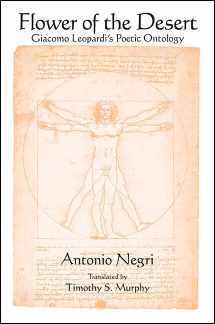
Flower of the Desert: Giacomo Leopardi's Poetic Ontology (Suny Contemporary Italian Philosophy)
ISBN-13:
9781438458472
ISBN-10:
1438458479
Author:
Antonio Negri
Publication date:
2015
Publisher:
State University of New York Press
Format:
Hardcover
448 pages
FREE US shipping
Book details
ISBN-13:
9781438458472
ISBN-10:
1438458479
Author:
Antonio Negri
Publication date:
2015
Publisher:
State University of New York Press
Format:
Hardcover
448 pages
Summary
Flower of the Desert: Giacomo Leopardi's Poetic Ontology (Suny Contemporary Italian Philosophy) (ISBN-13: 9781438458472 and ISBN-10: 1438458479), written by authors
Antonio Negri, was published by State University of New York Press in 2015.
With an overall rating of 4.4 stars, it's a notable title among other
books. You can easily purchase or rent Flower of the Desert: Giacomo Leopardi's Poetic Ontology (Suny Contemporary Italian Philosophy) (Hardcover) from BooksRun,
along with many other new and used
books
and textbooks.
And, if you're looking to sell your copy, our current buyback offer is $0.3.
Description
Antonio Negri, one of Italy's most influential and controversial contemporary philosophers, offers in this book a radical new interpretation of the nineteenth-century Italian poet Giacomo Leopardi. For Negri, Leopardi is not the bitter, idealistic individualist of conventional literary history, but rather a profoundly materialist thinker who sees human solidarity as the only possible solution to the catastrophes of history and politics. Negri traces Leopardi's resistance to the transcendental idealism of Kant and Hegel, with its emphasis on reason's power to resolve real antagonisms into abstract syntheses, and his gradual development of a sophisticated poetic materialism focused on the constructive power of the imagination and its "true illusions." Like Nietzsche (who admired him), Leopardi provides an alternative to modernity within modernity, expressing a force of rupture and recomposition--a uniquely Italian one--that is as relevant now as it was in the nineteenth century, and which connects to the theory of Empire as the political constitution of the present that Negri has elaborated in collaboration with Michael Hardt.


We would LOVE it if you could help us and other readers by reviewing the book
Book review

Congratulations! We have received your book review.
{user}
{createdAt}
by {truncated_author}


